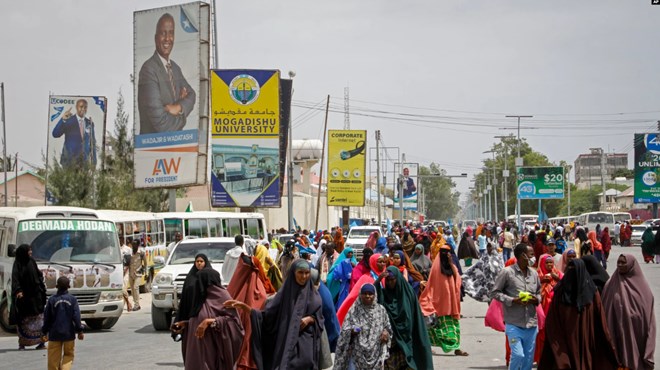WASHINGTON — Somalis across the world marked 62 years of independence Friday with little jubilation and much concern about a future blackened by drought, food shortages, and inflation.
The July 1 holiday commemorates the day Somalia declared independence from British and Italian colonizers, 62 years ago.
For more than three decades, Somalis have marked this day under the threat of chaos and violence, but this year is different. The fear of looming catastrophe in some areas, as a result of a severe drought, which already is turning into famine, has over-shadowed its commemorations.
According to Somalia’s special envoy for humanitarian issues, Abdurahman Abdishakur Warsame, more than 6 million Somalis — nearly half of the country’s population — have been affected by the record drought.
On Thursday, a day before the country’s Independence Day, Warsame said that “the drought has hit 72 of Somalia’s 84 districts and that six of them were already facing famine-like conditions, with extreme food insecurity.”
Doctors in hospitals across several regions in south and central Somalia have reported that children are dying as a result of the situation.
Somalia is experiencing one of the worst droughts in 40 years, and the U.N. and other international aid agencies raised the alarm last month as they warned that 330,000 children in Somalia were at risk of dying from starvation.
Speaking at a small-scale independence commemoration ceremony held Friday at the Mogadishu City House, Somalia’s President Hassan Sheikh Mohamud voiced the country’s greater concern.
“We have decreased the national celebrations for Independence Day to minimize the cost and direct our little available funds to the drought response and saving lives,” Mohamud said.
Mohamud, who was elected in May, directed his remarks to Somali citizens and the international community, pleading for immediate action to help save lives.
Somalia was created in 1960 from a former British protectorate and an Italian colony but collapsed into anarchy following the overthrow of the military regime of President Siad Barre in 1991.
Nearly three decades of civil war, fierce battles among clan warlords, piracy, and terrorism have torn the country apart into clan-based fiefdoms, and rural areas controlled by extremist militants.
A new dawn of hope formed in 2000, however, when a central government backed by the international community was established to assert control over lawless areas. Since then, the country has been inching toward stability, despite facing serious challenges from al-Qaida-aligned al-Shabab insurgents.
Among humanitarian challenges since 2011, the country has grappled with devastating cycles of deadly drought and mass displacement, including one that began earlier this year.
But unlike previous hunger calamities, this one is being exacerbated by a combination of factors: Russia’s invasion of Ukraine, the impact of the coronavirus pandemic, and locust infestations.
Meanwhile, the Somali diaspora community also is commemorating the day, while exercising caution and exhibiting less jubilation. In Minneapolis, Minnesota, which is home to the largest population of Somalis in the U.S, the community is hosting smaller parades and other events Friday to celebrate their original country’s birthday.
Similar events were held in Toronto, London, Nairobi, and several cities in Europe, not only to celebrate, but also as a reminder of the country’s dire situation and as an opportunity to raise funds.
Source: VOA; Mohamed Olad Hassan
Saturday July 2, 2022

